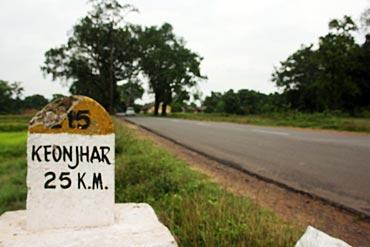
Rediff.com's Toral Varia and photographer Reuben Verghese travel to the red bastion of Odisha's Keonjhar district and meet Naxalites who have chosen to give up their arms and return home.
Some 283 km north of Bhubaneswar, spread over 8,240 sq km, is Odisha's Keonjhar district.
Five years ago, Naxalism first appeared in this district. Under the command of the Communist Party of India-Maoist's 34-year-old state committee member Basant, more popularly known as Comrade Sushil among Maoist cadres, Keonjhar gradually started gaining importance among the Maoists/Naxalites.
Ever since, like other Naxal-affected district, the state administration and the outlaws have been at loggerheads.
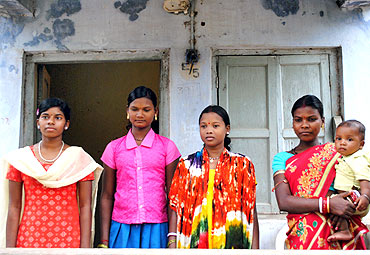
According to the Communist Party of India-Maoist, Keonjhar district falls under the Orissa state organising committee's Kalinganagar division.
Incidentally, over 96 per cent of the district's population is composed of over 46 Scheduled Tribes.
Circa 2010, the strength of the CPI-Maoist's Kalinganagar division is gradually, but firmly thinning. "Surrender of Maoists is not a new phenomenon in Orissa. But the numbers here are certainly encouraging. In 2011, till date 21 party members have surrendered," says Keonjhar Superintendent of Police Ashish Singh.
The police interrogation of the returning rebels reveals increasing levels of discontent and disillusionment with the CPI-Maoist, its members, ideology and actions.
"Whoever has stayed with the party for two, four years has got fed up with the violence, attacks on tribals, and its false and futuristic claims of developmental activities," says Singh.
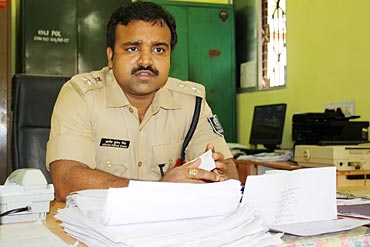
The scheme for surrender and rehabilitation of the left-wing extremists is informally known as Ghara Bouda, which literally means 'return home'.
Superintendent of Police Singh, who took charge of the district in 2010, believes the implementation of the state's surrender policy has made the difference.
Most of those who chose to give up arms are between the ages of 15 and 24 years. Women outnumber men. Of the 21 who have surrendered this year, 13 are women.
"The women who have abandoned the party say their basic needs are not taken care of," says Singh."Some have even complained of mental and physical abuse."
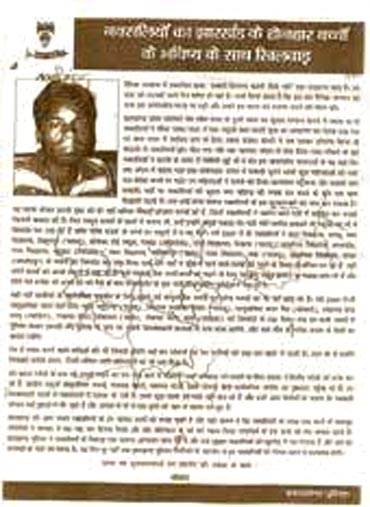
At regular intervals, the local police undertake propaganda exercises by circulating pamphlets, sharing success stories of rehabilitated recruits through the local media, and explaining the benefits of the surrender scheme during community drives, locally known as the Maithili programme, held in the extreme interior villages of the district where authorities and villagers break bread together.
"It is important for us to indulge in the propaganda because even the extremists keep track of what the local media is reporting on, and regularly interact with the villagers," says Superintendent of Police Singh. "We leave pamphlets and posters behind in the village after community get-togethers."
The objective is two-fold: One, to contain violence by the rebels by bringing them back into the fold; and, two, to ensure that once the rebels are rehabilitated and reformed they do not revert to their extremist ways.
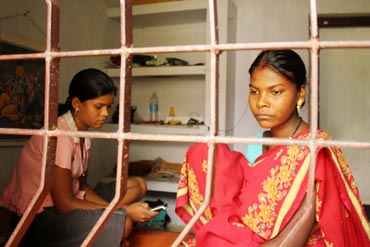
The scheme is applicable to extremists who have a criminal record, or known to be important office-bearers of the CPI-Maoist and are willing to surrender with firearms.
An extremist can choose to surrender before a district magistrate, local superintendent of police, sub-divisional magistrate, sub-divisional police officer, circle inspector, inspector or officer in charge of a police station.
Any official who receives a surrendered rebel forwards his case to the local police station for initiating legal action or to a rehabilitation camp till his resettlement scheme is worked out.
Those who surrender will be eligible for appropriate assistance for rehabilitation, but only after they satisfy conditions set by the government.
For instance, the rebel has to reveal the real names and identity of other members, financers, harbourers, sympathisers, couriers etc of the banned outfit.
Those who surrender must make a clear confession of all the criminal acts committed by them along with relevant details like the name of the planner, other participants in the criminal act, arms and ammunition that was looted, etc.
The rebel is also expected to make a public statement of his voluntary surrender via the media.
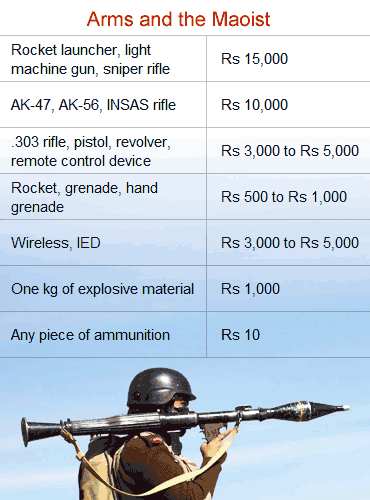
Every surrendered extremist is vetted by a 'screening committee' comprising the district magistrate, the local superintendent of police and a nominated representative of the state intelligence department.
There is also a district rehabilitation committee for surrendered extremists in each district comprising of the DM, SP, and chairperson of the zilla parishad and a representative of a local co-operative bank.
The SP is the convenor of the meetings and the rehabilitation committee then goes on to prepare the rehabilitation package based on the socio-economic background of the surrendered candidate, his or her age, general education, technical qualification, preference for the kind of rehabilitation, and viability of the package.
After a rehabilitation package has been worked out by the DRC, the proposal is then forwarded to the state government through the director general of police or the inspector general of police.
Usually when a Maoist surrenders, he is immediately paid up to Rs 10,000 to meet any immediate demands. Over and above that, up to Rs 20,000 is given to a rebel for surrendering with arms in working condition, live ammunition and explosives.
The state pays different rates for different kind of weapons that a rebel surrenders with, the highest being Rs 15,000 and the lowest being Rs 10.
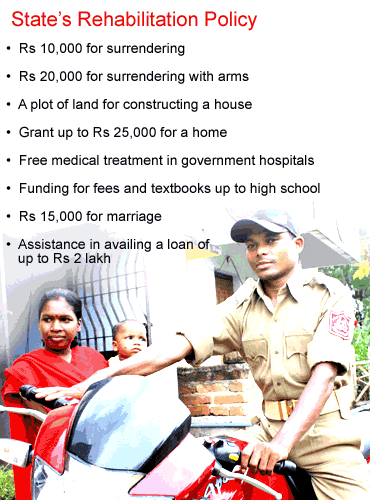
Apart from the cash reward, a surrendered Maoist is also entitled to several other incentives.
However, the government will also prosecute the former rebel for all the major criminal charges against him/her in an appropriate court of law. At the same time, a proposal to withdraw cases related to minor offences will be forwarded to the state government.
The final package for rehabilitation differs from candidate to candidate, depending on his or her eligibility, and what s/he brings to the table -- both in terms of information as well as hardware.
In the next part of this series, read about the growing rift between the Odisha and Andhra factions of the CPI-Maoist